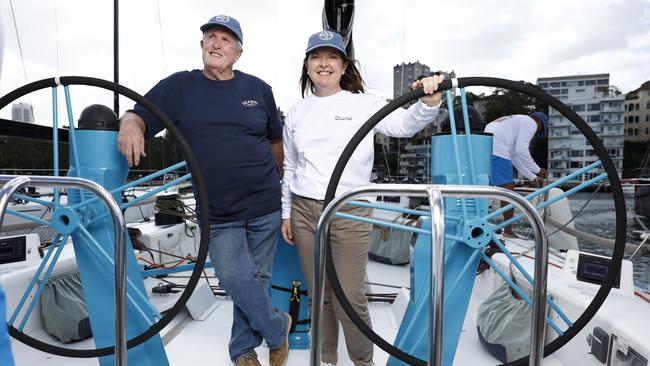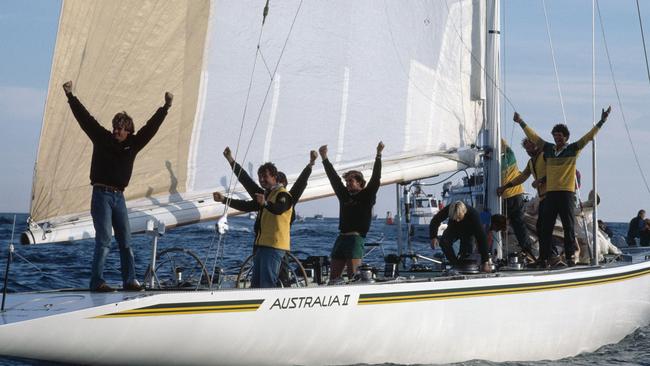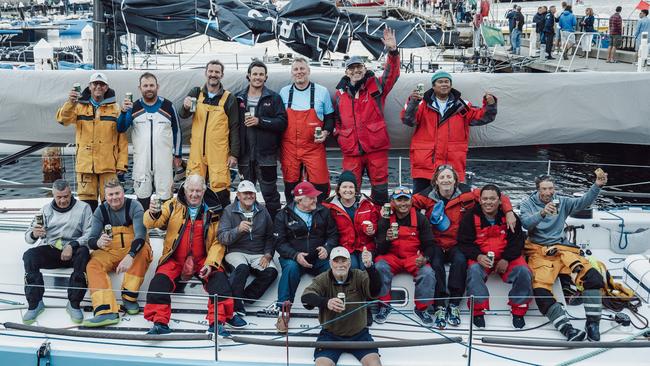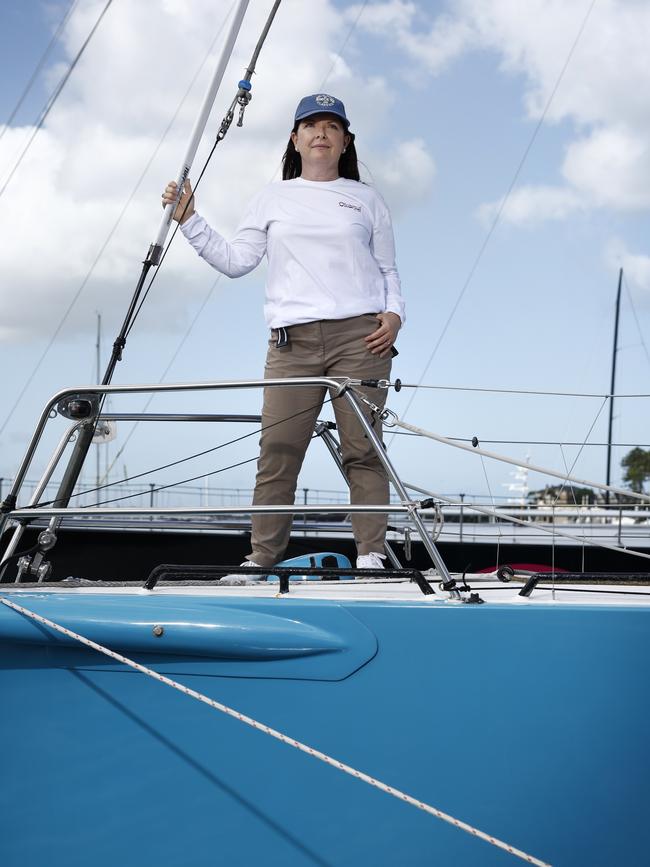Investment banker Geoff Hill back for one last Sydney Hobart adventure on Antipodes
Investment banker Geoff Hill would love the focus on the Sydney Hobart race to get back to the ordinary people doing the race and away from the big Maxis.

Investment banker Geoff Hill would love the focus on the Sydney Hobart race to get back to the ordinary people doing the race and away from the big Maxis, which he describes as “cheque book yachting”.
The chairman of investment company International Pacific Securities, and former head of Morgan Grenfell Australia, who once advised some of Australia’s corporate raiders including Alan Bond and John Spalvins, Hill says next week’s race, his 21st Sydney Hobart, will be his last. He will be completing the race with his daughter, Natasha Parker, who is competing for her third time.
Hill, who sailed as a young boy, was inspired to take it up more seriously when he watched the Bond-owned Australia II’s historic America’s Cup win at Newport in 1983.
But he would love to see more attention on ordinary sailors in the race. As he sees it, for most participants, the Sydney Hobart is about friends getting together on a boat for their one big event of the year.

Interviewed on his Santa Cruz 72 yacht Antipodes at the Cruising Yacht Club at Sydney’s Rushcutters Bay this week, Hill says there are two streams of sailors in the race: those involved in “cheque book yachting” and ordinary sailors.
“If you’ve got enough money, you can buy the fastest boat, you can employ the most experienced crew, and you should win,” Hill says.
“But that’s not what Hobart is about, or how it started.
“It was six pretty ordinary guys on boats who turned right at Sydney heads on Boxing Day and headed for Tasmania.
“That’s still what around 80 per cent of the boats are doing – average guys who saved up their money with some mates and are heading south.
“That gets lost in all the hype about the Maxis and the big guys and all the heroes. The unsung heroes are the young people taking out a 30 or 40-footer for their big event of the year.
“They go there with some mates, and they take four or five days to get down there.”
Hill’s Antipodes is never going to win the race, even on handicap.
“This boat’s an old boat,” he says of Antipodes, which he bought in pieces in the US in 2011 when boats were cheaper in the wake of the 2008 global financial crisis. He spent a year putting it together, tested it in the Antigua race week and then sailed it to Hong Kong, where he was living at the time.
“It’s never gonna win Hobart – but it will do OK for itself, and the team enjoy sailing it,” he says.

At 78, Hill says it is time for him to bring his Sydney Hobart days to an end.
“The reality is, if I wasn’t the owner, you wouldn’t pick me on the crew,” he says with his typical frankness. “You would get someone younger.”
Hill’s move from Sydney to Hong Kong for business, around 2005, allowed him to continue his yachting, including taking Antipodes on the Asian racing circuit. He moved back to Sydney several years ago as a result of a combination of Covid and health issues.
After being below the radar on the Australian corporate scene for many years while in Hong Kong, Hill is amused to see that his father-daughter racing story has captured media attention this week.
Natasha is his oldest child, the only girl in a family of five children. Hill is proud that “Tasha”, a mother of two teenagers herself, loves offshore racing.
“Tasha is the oldest in the family,” he says. “We always got on well, but she’s a very strong person in her own right.”
While his four sons have also been involved in sailing, he admits that he may have pushed them a bit hard when taking them out on his boat when they were teenagers.
He is proud that his daughter will be with him on his final Sydney Hobart.
“I was surprised that she enjoys offshore sailing,” he says. “It’s very special for me that she does enjoy it.”
This time around his boat is being sponsored by sportswear clothing company Okanui, which has its origins in the Sydney suburb of Avalon Beach.
Hill has been wearing its gear for a while, having been introduced to it by Marcus Blackmore, whose eponymous family business (since sold to a Japanese buyer) is based on the northern beaches.

Okanui was founded in 1978 by Dick Ash, who sold it to his niece, Wendy Kasprowicz, to ensure that the business stayed in the family.
Hill’s Sydney Hobart experience has included the fatal race of 1998, when terrible weather resulted in six people dying, five yachts lost and 55 sailors having to be rescued.
Sailing his original Antipodes, Hill was forced to pull into the NSW south coast town of Eden in a move recorded as “prudent seamanship”.
He still remembers being in trouble off the NSW south coast and hearing the SOS calls from fellow sailors.
“We were very lucky,” he recalls. “It was harrowing when you could hear all the SOS calls on the radio. There was no one near us, but we were fighting for survival ourselves.”
One of his best memories is the race of 2006, when he was on an old wooden boat, S&S 47, Love & War, which was skippered by Lindsay May and was the overall winner.
Hill’s crew for this year’s race have 200 Sydney Hobarts between them, including his 20 so far, and Natasha’s two.
“That makes a huge difference,” he says. “We’ve got some good young guys, and the Filipino crew have been with the boat for seven or eight years and know everything about the boat.”
Hill says the Antipodes crew did “pretty well” last year.
“We came 23rd or 24th which, for us was pretty good. We’re not a professional group. We had a couple of good guys on the boat, and it was enjoyable.”
The only difficult time last year was when they rounded Tasman Island to turn up towards Hobart.
“If you look at the photos, you can see we got absolutely smacked once we went around Tasman Island. We had [winds of] 35-40 knots. There are some great shots of the boat on its ear.”
There are expectations of a fast race, leading to records being broken.
Hill says you can keep checking the weather for a race, but in the end “it will be what it will be when you get out there”.
Meanwhile, after sailing in locations around the world for decades, he says the number of people involved in ocean racing these days is declining, partly due to the high cost of running the boats, as well as the insurance needed for events such as the Sydney Hobart.
“It has got more expensive and more complicated,” he says. “[Ocean racing] still has a cache.
“The cheque book sailors are good for about three or four years. Then, if they’ve won everything, they go. If they haven’t won anything, they go too.”
But he says the rising cost makes it difficult for people like him to participate in these races.
“There aren’t as many business people doing these offshore races because of the expense,” he says. “The offshore fleet is smaller worldwide. In Hong Kong, it’s dropped from 40 or 50 boats to around 12. If you talk to the guys in the US, the offshore fleet is still smaller.”
He says the pandemic also deterred people from offshore racing, with some people never having returned.
For the moment he is concentrating on the race ahead of him and his daughter. And he says Natasha has learned a lot from her past two Sydney Hobarts.
“She works well with the team,” he says. “They’ll look after her. She’s learnt that dynamic leadership and team work is what it’s all about.”




To join the conversation, please log in. Don't have an account? Register
Join the conversation, you are commenting as Logout